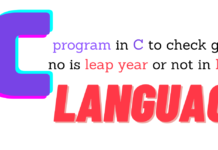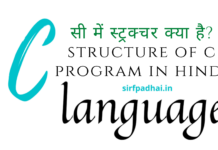Advantage of structure and union in c
In C Programming, a “Structure” is a custom-made data type created using basic and derived data types. It allows you to store multiple pieces of information with different data types in separate memory locations. Each of these data types within a structure serves a unique purpose and is valuable for various programming tasks.
To illustrate this concept, consider the following example of a structure in C:
struct Person {
char name[50];
int age;
float height;
};In this article, we will explore the benefits of using structures and unions. Both structures and unions offer essential features widely used in many programming languages, including C and C++. They are primarily employed to organize and manipulate data within computer programs. So, let’s dive into this important topic.
Advantages of Structure in c
1)Organizing Data: – Structure helps us to organize different types of information into a single frame. In other words, we can say that it is the way of putting all the information or data into a single container, just like putting all the parts of a toy in one box. The structure allows you to organize data logically as you organize items in different compartments making it simpler to find and use the data when needed.
2) Easy Access: – With the help of Structure we can easily access each piece of information by its name and make it simple to find and use whatever you need. We can control the access to the individual fields within the structure by using specifiers. Here in C++, we use three types of specifiers such as “public”, “private”, and “protected”. But in C we do not have built-in access control, instead of it we can use comments to indicate the usage of fields.
3) Readability: Structure makes our code easier to understand because it gives us a clear structure of data that allows data to be organized in the form of rows and columns. We can also say that Structure makes our code more readable by giving meaningful names to different parts of our data and making it easier for us as well as others to understand what the code is doing.
4)Code Reusability:- Structures allow you to use the same data structure in multiple parts of your code, like using different tools repeatedly. This makes it easier to update and maintain your code over time.
5)Clarity:- Using structures in your code makes it clearer by showing how data is related to each other, like sorting clothes into different drawers for pants, shirts, socks, etc., making them easy to find when needed.
6)Flexibility:- Structures let you create custom data types that fit your specific needs, similar to designing your own logo with the information you want.
What is a Union and Its Advantages in C Programming?
A union is a special kind of data type that we can create in C programming. What makes it special is that it lets us store different types of data in the same memory location. However, there’s a twist – at any given time, only one of its members can contain a value. In other words, it’s like a container that can hold different things, but only one thing at a time.
Here’s a basic example of how you can define a union in C:
#include <stdio.h>
union Data {
int i;
float f;
char str[20];
};Advantages of Union in c
Now, let’s explore why unions are useful and what advantages they offer in the world of C programming:
1)Memory Efficiency:- The most important benefit of using unions is their ability to save memory. In a union, all its members share the same memory location. This means you can represent different data types using the same memory space. This is particularly handy when you’re working with limited memory resources because it helps optimize memory usage.
2)Flexible Use:- Unions are incredibly versatile. They can be used for various purposes, like interpreting data, converting between different data types, or manipulating bits within data. Imagine them as magic boxes that can hold different things at different times, depending on your needs.
3)Simpler Code:- Unions make your code more straightforward. You can work with data directly without dealing with complex conversions or using multiple variables. In situations where data can have multiple valid representations, unions simplify your code by allowing you to work with it directly.
4)Data Transformation:- Unions allow you to transform data easily. For example, you can convert temperatures from Fahrenheit to Celsius (or the other way around) without much hassle.
5)Bit Manipulation:- Unions are handy for efficient bit manipulation. This is especially useful in low-level programming or when dealing with hardware interfaces where you need to work with individual bits.
6)Adaptability:- Unions can adapt to the data they hold. If you decide to change the data type within a union, it seamlessly adjusts to accommodate the new data type. This adaptability is a valuable feature when you’re working with varying data.
Conclusion
So these all are the advantages of structure and unions in C programming. In brief, we can say that Structures are basically used to group different types of data together and provide a way of organizing complex data structuress. On the other hand, unions are used to optimize memory usage and also work with data that can change dynamically. So if we talking about the choice between these two specific data types then It totally depends on specific programming needs. Both structure and union have their own importance. Both structure and unions are valuable tools that enhance the capabilities and efficiency of C programs.








